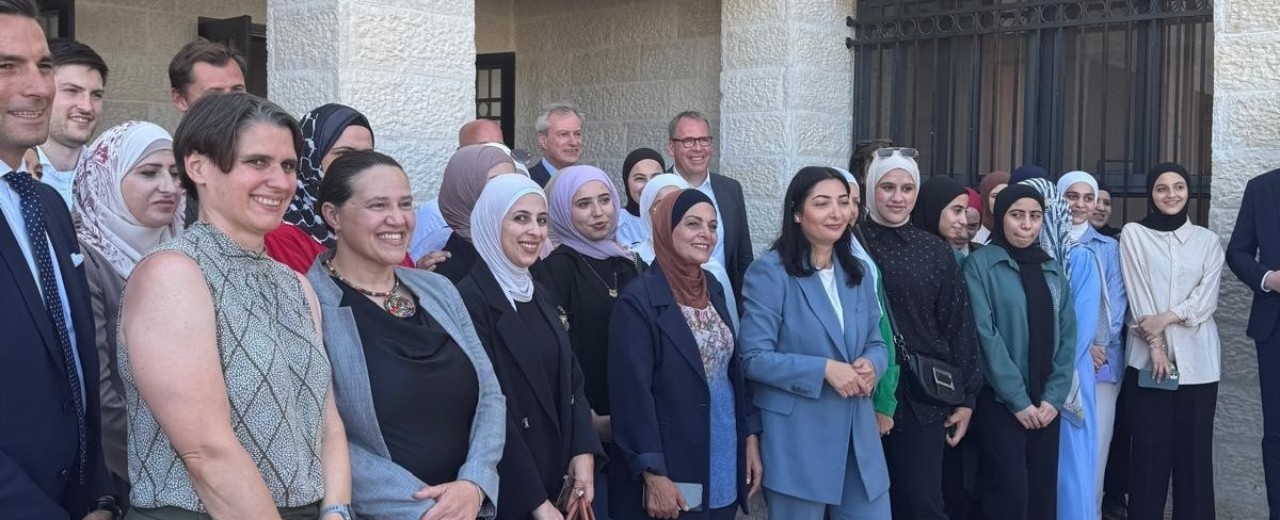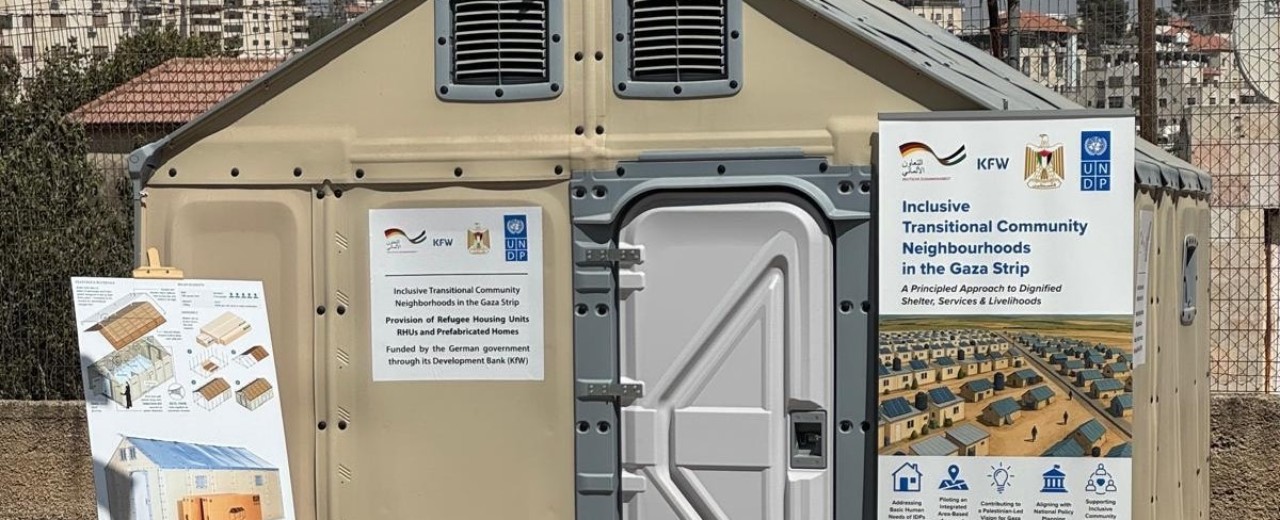News from 2025-08-29 / KfW Development Bank
Federal Development Minister Reem Alabali-Radovan pledges support for the people of Gaza

‘How did you manage to become a minister at such a young age?’ That was the question posed by the headmistress of Al-Quds Girls' High School near Jerusalem to Federal Development Minister Alabali-Radovan. Her answer was honest: the new role is still unfamiliar. ‘We (she and the second young minister, Verena Hubertz) are still improving.’ 360 pupils – many from the Qalandia refugee camp – attend the school, which was completed in 2024 with German support.
Although it is still the school holidays, the headmistress was accompanied by 15 pupils. A lively conversation ensued between the minister and the pupils about their life paths and dreams for the future.
„Early recovery“ – Support for Gaza
Federal Development Minister Reem Alabali-Radovan (35) spent four days travelling through the Middle East with members of parliament and journalists: in the West Bank and Israel, and on Thursday she travelled on to Saudi Arabia via Jordan. During her trip, she pledged support for the people of Gaza. Plans include temporary accommodation, the repair of water pipes and schools, and cash-for-work programmes for short-term jobs. The early recovery package is intended to enable the restoration of basic services after a permanent ceasefire and pave the way for reconstruction. It is being implemented by the UNDP in cooperation with KfW Development Bank.

In Ramallah, the delegation had the opportunity to visit such temporary accommodation, known as ‘refugee housing units’. These are modular emergency/temporary shelters that are more durable than tents, but are not permanent houses. The shelters have already been ordered and will be brought to Gaza as soon as the situation allows. Initially, around 400 particularly affected families will be accommodated there, while preparations for further transitional housing solutions are being worked out in parallel to provide longer-term support for displaced families. Ninety-two per cent of all residential buildings in Gaza are damaged or uninhabitable, which means that almost everyone is ‘living’ in tents or outdoors.
In addition to these two visits to FC projects, talks were held at the political level in Ramallah (Prime Minister, Minister of Planning) and in Israel. There, the Minister met with representatives of the Israeli authority COGAT, which, among other things, coordinates the logistics for imports into Gaza – and therefore also has to approve the import of mobile housing units. In Tel Aviv, Alabali-Radovan also met with relatives of Israeli hostages. She is campaigning for the unconditional release of the hostages, who have now been held captive by the terrorist organisation Hamas for almost two years. During the talks, Alabali-Radovan also emphasised Germany's demands for an immediate ceasefire in the Gaza Strip and easier access for humanitarian aid deliveries to Gaza.
KfW Development Bank: strongly committed to the Jordanian water sector
From the West Bank, the delegation travelled on to Jordan. The programme included a visit to the only remaining groundwater source in Amman, accompanied by state secretaries from the Ministry of Water and the Water Authority. The Federal Institute for Geosciences and Natural Resources (BGR), which is responsible for the programme, gave a presentation on groundwater management and quality in Jordan. The topic of growing and, in some cases, dramatic water shortages – exacerbated by strong population growth, including the influx of refugees – was also discussed.
KfW Development Bank has been involved in a large number of water supply and wastewater disposal projects in the country for decades. The great importance that Jordanians attach to development cooperation in this area was impressively expressed by the State Secretary from the Ministry of Water when asked by the BMZ delegation what would happen if German development cooperation were to withdraw its support for the Jordanian water sector: ‘We would all die. There would be no water in Jordan – we would all die.’
Completion in Saudi Arabia – potential collaborations
At the end of her trip, the minister travelled to Saudi Arabia, where she discussed potential cooperation in Syria and the Palestinian territories with a state secretary from the Saudi Ministry of Finance, with the focus on the reconstruction of the Gaza Strip and humanitarian aid. One of the topics discussed was the Saudi Development Fund (SDF), which provides both humanitarian aid in the Islamic world and loans for global development projects. Following the withdrawal of USAID from international cooperation, the visit to Saudi Arabia is part of a broader strategy by Germany to forge new alliances.

Share page
To share the content of this page with your network, click on one of the icons below.
Note on data protection: When you share content, your personal data is transferred to the selected network.
Data protection
Alternatively, you can also copy the short link: https://www.kfw-entwicklungsbank.de/s/enzBWrMC.DScA
Copy link Link copied